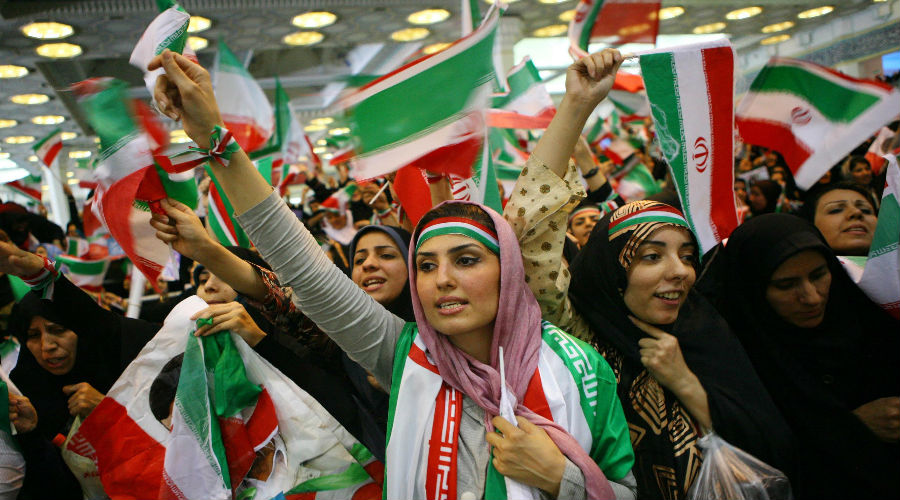As the date of the Iranian presidential elections on May 19th 2017, approaches, there is a growing debate in political circles about many domestic and foreign issues. It is notable that some regime institutions were especially interested this year to mark the anniversary of the 9th of Dey 1388 (30th of December 2009) events, when masses took the streets to voice their support for the Islamic Republic regime and the Supreme Guide Ali Khamenei in the face of protests that broke out after presidential election results in June of that year gave then President Ahmadinejad a second term in office.
Khamenei said “these events were a saga written by the people” and some of his supporters began to warn about the possibility there will be a repeat of the 2009 events during the upcoming presidential race. They accuse the US and Britain of fanning these anticipated demonstrations with the aim of undermining Iran’s political and security stability in the coming phase.
The adviser to the Guide’s representative in the Iranian Revolutionary Guard (IRG) Heydar Moselhi said on December 29th 2016, that “the strife of 2009 did not end and global arrogance and its domestic agents are still trying to create other disturbances”. Moselhi’s statements are especially significant because of his strong ties to Khamenei. In fact, the supreme guide intervened to annul a decision by former President Ahmadinejad sacking Moselhi as Intelligence Minister in April 2011. In response, Ahmadinejad decided to stay at home for ten days in protest of the Guide’s decision, but then returned to his office later. This means these statements reflects the general outlook of the Guide himself and key state institutions, most notably the IRG, that still believe they cannot rely on involvement in any international commitments with the US. This is in reference to the nuclear deal that is still problematic in implementation because of sanctions against Iran by the US, and its intentional obstruction of raising the level of financial transactions between banks in Iran and the West.
Multiple goals:
Accordingly, by focusing on the 9 Dey events, some state institutions and political forces want to achieve several goals, including:
1- Issue direct warnings to President Hassan Rouhani about the repercussions of revisiting the 2009 crisis in the remaining five months of his first term in office, especially since he is being pressured by his allies to settle what can be described as the “remnants” of this crisis before nominating him in the next elections. On the basis that this is enough to boost his chances of winning a second term.
The conservative fundamentalist current wants to send the president a direct message that his response to pressure by his allies could undermine his chances of winning a second term, especially since it will put him in direct confrontation with the Guide and influential regime institutions that still embrace strict conditions to settle this problem – including admission by protest leaders of what is known as the “2009 strife” that they were mistaken, and apologizing for their actions against the regime and state.
Rouhani intentionally responded to these messages by emphasizing the importance of not taking advantage of the 9 Dey anniversary to settle partisan scores, referring to his political rivals wanting to manipulate the occasion to put more pressure on him before the presidential race.
2- Respond to the calls by many prominent political figures to end the house arrest of former Prime Minister Mir-Hossein Mousavi, his wife Zahra Rahnavard, and former chairman of the Shura Council Mahdi Karroubi since February, 2011, when they asked authorities to allow them to organize marches supporting revolutions and demonstrations in several Arab countries at the time.
It is notable that deputy chairman of the Shura Council Ali Motahari led these calls in recent times, although he is a leading figure in the conservative fundamentalist camp but adopts partially divergent positions than the radicals in this current. In fact, radicals refused to nominate Motahari on their list in the last parliamentary elections. Instead, Motahari, the son of Ayatollah Motahari, a prominent cleric, joined the “Voice of the People” list and succeeded in holding onto his seat, coming second in the capital Tehran. He also won the position of deputy parliament speaker.
This demonstrates that the conservative fundamentalist current is not united on this issue, but the general trend within it leans towards supporting measures by the regime against protest leaders and some political detainees. This could perhaps be for political gains, or to obstruct efforts by moderates to expand their presence within the regime. In fact, some conservative fundamentalists felt that putting Mousavi and Karroubi under house arrest was “an act of mercy towards them because the more just decision would have been their execution”.
3- Renewing the regime’s legitimacy and validating its view on developments at home and overseas, which is primarily based on a conspiracy theory that foreign powers and domestic elements want to undermine the foundations of the regime and destabilize the country.
It is notable that along with growing interest by the regime in the 9 Dey anniversary, state media began once again focusing on how the Syrian conflict aims to undermine Iran’s regional role, threatens Iran’s interests and that the Syrian regime is a key component in helping Iran promote its regional role, especially since it connects it with militias loyal to it – specifically Hizbullah.
It is likely the regime will continue to adopt this “conspiratorial” rhetoric in the coming phase, as Iranian grows more anxious about possible outcomes of the Syrian conflict after Russia and Turkey recently reached several understandings that could lead to a settlement that threatens its interests in Syria. This indicates that in the coming phase the regime in Iran will attempt to balance pressure from events abroad and domestic politics to deal with possible repercussions from these pressures.


